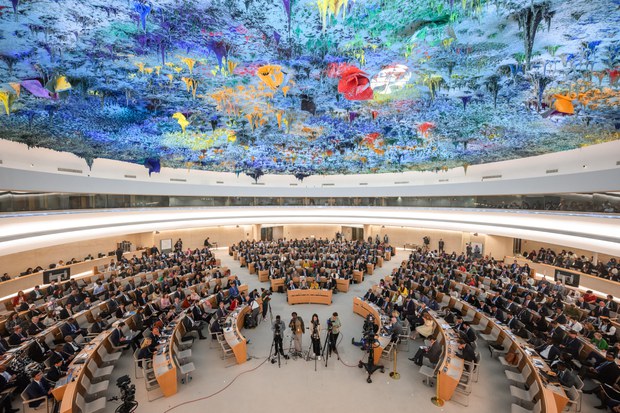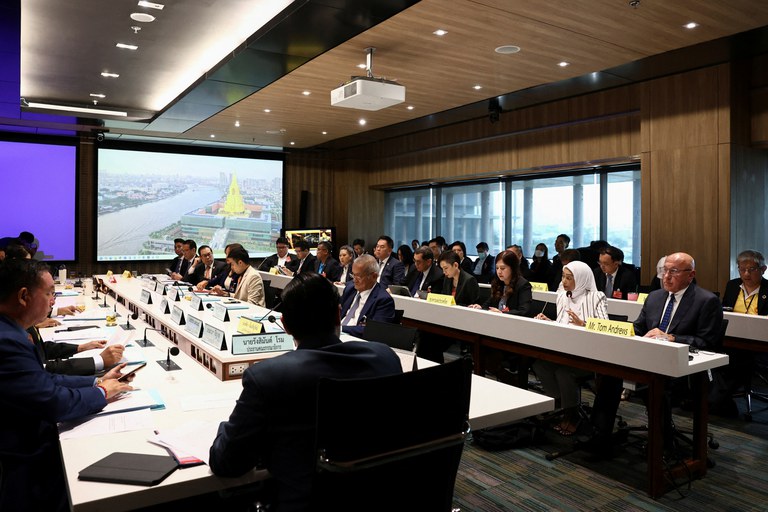Thailand elected UN Human Rights Council member amid ‘questionable’ civil liberties record
2024.10.10
Bangkok
 A view of delegates at the opening session of the United Nations Human Rights Council in Geneva, on September 9, 2024.
A view of delegates at the opening session of the United Nations Human Rights Council in Geneva, on September 9, 2024.
Thailand was elected a member of the United Nations Human Rights Council (UNHRC) for a three-year term starting Jan. 1, 2025, amid domestic and international concerns over its stance on civil liberties.
Human rights activists said they hoped the Thai government would use its UNHRC membership, secured after Wednesday’s election by General Assembly members, as an opportunity to guarantee the right to freedom of expression at home and change its stance on deporting political refugees.
“On 9 Oct., 2024, the General Assembly elected the following 18 members for the term 2025-2027," said a statement on UNHRC's website, which then listed the countries.
The statement added that the members were “elected directly and individually by secret ballot by the majority of the members of the General Assembly.”
“The membership shall be based on equitable geographical distribution,” the council said.
South Korea was the other nation elected from the Asia-Pacific geographical group.
The 47-member council is responsible for monitoring violations worldwide and establishing norms for promoting and protecting human rights.
Thailand began efforts to gain UNHRC membership during the tenure of Parnpree Bahiddha-Nukara as foreign minister from September 2023 to April 2024.
The Thai government in September last year invited ambassadors and high-level delegates from more than 100 countries to attend an event marking the start of its campaign for UNHRC membership.
Thai record 'questionable'
Before Wednesday’s election, three human rights groups, United Nations Watch in Switzerland, Human Rights Foundation in the U.S., and the Raoul Wallenberg Center for Human Rights in Canada jointly issued ratings of the candidate countries seeking UNHRC membership this year.
The report said that of 19 candidates, five were “unqualified” for membership, seven had a “questionable” rating because they had a “problematic human rights and/or U.N. voting record,” and seven were “qualified.”
Thailand was among the seven countries that were rated “questionable.”
But for Thai Foreign Minister Maris Sangiampongsa, winning meant that U.N. members see “Thailand’s potential to contribute to human rights development within the U.N. framework.
“Under the leadership of Prime Minister Paetongtarn Shinawatra, the government places importance on promoting and protecting the human rights of Thai citizens, as well as efforts to amend the constitution to establish a democratic people’s constitution,” Maris told reporters on Thursday.
For social research analyst Piyapong Pimpaluck, Thailand’s successful bid was “both an opportunity for international recognition and a challenge.
“Thailand will face increased scrutiny on its human rights record. The Thai government continues to face criticism for its handling of political prisoners, especially youth activists,” the assistant professor from the Chiang Mai University Social Research Institute told BenarNews.
“The UNHRC membership will test whether the government can reform and elevate its practices to meet international human rights standards,” he said.
Thailand has received letters of concern from the U.N. in recent years over the prosecution of political protesters and harsh sentences given in cases related to royal defamation.
For instance, one activist was handed a 50-year prison sentence and another a little over 43.
According to the group Thai Lawyers for Human Rights, at least 1,956 people have faced legal action related to political protests and expressions from 2020 to August 2024. Among them, 273 individuals face 306 cases to do with lèse-majesté, or royal defamation.
Currently, at least 28 people are imprisoned under the lèse-majesté law.
Additionally, the U.N. raised concerns about the Constitutional Court’s order to dissolve the Move Forward Party for its campaign to amend the royal defamation law.
The U.N. has recommended several times that Thailand guarantee the rights to freedom of expression and peaceful assembly.
Another pressing issue is the Tak Bai case, which is set to reach its statute of limitations on Oct. 25.
The so-called Tak Bai Massacre of October 2004 led to the deaths of 85 Muslim protesters in military custody. Most had suffocated to death in the backs of trucks where they were bound and stacked up like logs while being transported to a military camp.
Court officials recently learned that two suspects had fled the country, complicating efforts to bring the case to trial before the Oct. 25 deadline.

Pornpen Khongkachonkiet, director of the Cross-Cultural Foundation, told BenarNews the situation was dire.
“If Thailand can’t bring these suspects to trial before Oct. 25, it may invite international intervention, which would undermine Thailand’s image as a new UNHRC member,” Pornpen told BenarNews.
Meanwhile, Thailand has been roundly criticized for cooperating with foreign governments seeking the extradition of activists despite its commitment to the international principle of non-refoulement.
The principle prohibits forcing people back to places when they may be at risk.
Earlier this year, the U.N. voiced concern over Thailand’s potential deportation of Montagnard activist Y Quynh Bdap, who is detained in Bangkok Special Prison. If deported, he could face a 10-year sentence upon return to Vietnam.
The Montagnards are an indigenous ethnic Christian minority living in the central highlands of Vietnam.
Bdap, 32, is a founding member of the organization Montagnards Stand for Justice (MSFJ), which campaigns for the community’s rights and was named a terrorist group by Vietnam in March.
After years of intimidation by the Vietnamese government, he fled with his family to Thailand in 2018, hoping for more freedom as a refugee.
The United Nations High Commissioner for Refugees (UNHCR) recognizes the status of a refugee. Thailand has not ratified the 1951 U.N. Refugee Convention, which says such people are entitled to legal protection, rights and assistance.
Pornpen Khongkachonkiet, director of the Cross-Cultural Foundation, told BenarNews that the Thai government needed to urgently address the issue of the deportation of refugees who may face danger upon returning to their home countries.
Otherwise “it would be a negative signal for human rights and a betrayal of the trust placed in Thailand by countries that voted for its UNHRC membership,” Pornpen told BenarNews.
He, too, saw Thailand’s UNHRC membership as a chance for the country to deal with issues that have brought international criticism.
“This is an opportunity for Thailand to review and implement the numerous U.N. recommendations it has received over the years,” he said.
“It’s time for Thailand to clean its own house and act on previously missed opportunities to realize U.N. proposals."







